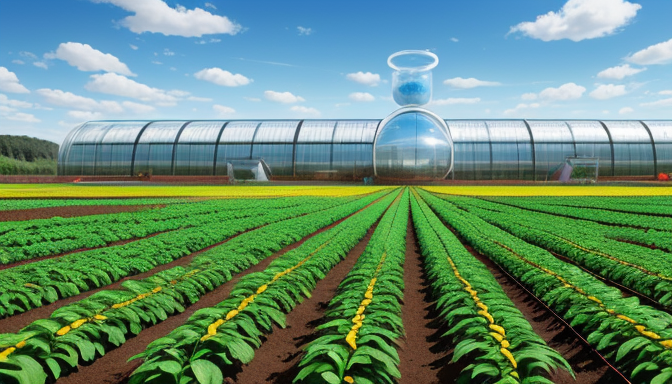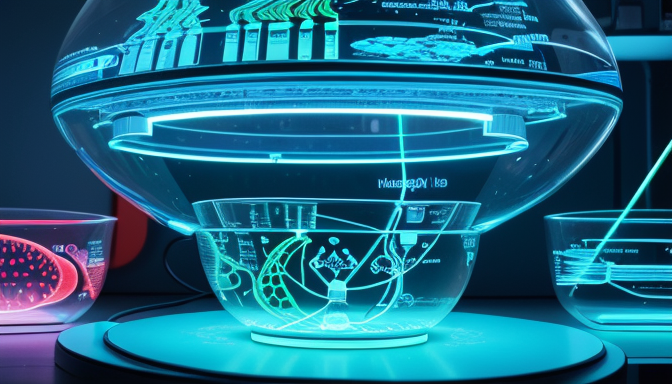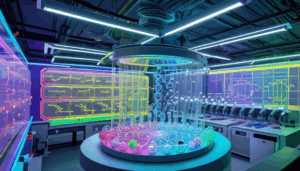Synthetic biology is not just a buzzword; it’s a game-changer that holds the key to unlocking solutions for some of the most pressing challenges we face today. Imagine a world where diseases are treated with tailor-made therapies, where crops can withstand harsh climates, and where our planet is rejuvenated through innovative environmental solutions. This is the power of synthetic biology, an interdisciplinary field that blends biology, engineering, and computer science to redesign living systems for beneficial purposes.
At its core, synthetic biology aims to engineer organisms to perform specific functions. Think of it as programming life itself! By manipulating genetic codes, scientists can create microorganisms that produce everything from medicinal compounds to biofuels. This opens up a realm of possibilities that were once confined to the realm of science fiction. For instance, researchers are already engineering bacteria to produce insulin, making diabetes management more efficient and accessible.
Furthermore, the applications of synthetic biology extend beyond just medicine. In agriculture, it promises to enhance food security by developing crops that are more resilient to pests and climate change. These advancements could lead to a future where food is abundant and sustainable, reducing our reliance on harmful pesticides and fertilizers.
However, with great power comes great responsibility. The ethical implications of altering life at the genetic level cannot be ignored. As we plunge deeper into this new frontier, we must ask ourselves: how do we balance innovation with caution? The potential of synthetic biology is vast, but it requires thoughtful consideration and regulation to ensure that we harness its capabilities for the greater good.
Applications in Medicine
Synthetic biology holds immense promise in revolutionizing healthcare, and it’s not just a buzzword—it’s a game changer! Imagine a world where diseases are not only treated but also prevented at their genetic roots. With innovative therapies and drug development, synthetic biology is paving the way for personalized medicine, which tailors treatments to individual genetic profiles. This could mean that instead of a one-size-fits-all approach to medication, patients receive therapies that are specifically designed for their unique biological makeup, leading to more effective treatments and improved outcomes.
One of the most exciting applications is in the realm of gene editing. Techniques like CRISPR allow scientists to modify genes with unprecedented precision. This opens up possibilities for correcting genetic disorders that were once deemed untouchable. For instance, consider the potential to eliminate hereditary diseases by directly editing the genes responsible for them. It’s like having a biological toolkit that can fix issues at their source!
Additionally, synthetic biology is making strides in vaccine development. By engineering microorganisms to produce antigens, researchers can create vaccines that are not only more effective but also quicker to produce in response to emerging infectious diseases. This capability was crucial during the COVID-19 pandemic, showcasing how rapidly we can adapt to health crises.
However, with great power comes great responsibility. The ethical implications of these advancements cannot be ignored. As we unlock the potential of synthetic biology, we must also navigate the challenges it presents, ensuring that we prioritize safety and ethical considerations in our pursuit of medical innovation.

Impact on Agriculture
Synthetic biology is not just a buzzword; it’s a revolutionary tool that is reshaping the landscape of agriculture. Imagine a world where crops are not only more resilient but also capable of thriving in harsh conditions. This is the promise that synthetic biology holds for farmers and consumers alike. By engineering plants to withstand drought, pests, and diseases, we can significantly enhance food security and sustainability. Think of it as giving crops a superhero cape, allowing them to fend off threats that would typically devastate harvests.
One of the most exciting applications of synthetic biology in agriculture is the development of genetically modified organisms (GMOs). These aren’t just your average GMOs; they are designed with precision to improve traits such as yield, nutritional value, and environmental adaptability. For example, scientists are working on crops that can grow in saline soils, which could open up new agricultural lands in areas previously deemed unfit for farming. This is crucial as the global population continues to rise, and we need to produce more food with fewer resources.
Moreover, synthetic biology can lead to the creation of crops that require fewer chemical inputs, such as pesticides and fertilizers. This not only reduces costs for farmers but also minimizes the environmental impact of agriculture. Imagine a farming system where pollution is significantly reduced, and biodiversity is enhanced. By engineering plants to naturally repel pests or fix nitrogen from the air, we can create a more sustainable agricultural ecosystem.
However, with great power comes great responsibility. The introduction of these advanced technologies must be accompanied by thoughtful regulation and ethical considerations. We need to ensure that while we unlock the potential of synthetic biology, we do not compromise biodiversity or the integrity of our ecosystems. Striking the right balance is key to harnessing these innovations for a brighter agricultural future.
Environmental Sustainability
In today’s world, where environmental challenges loom larger than ever, synthetic biology emerges as a beacon of hope. Imagine a future where we can engineer organisms to tackle pollution, produce renewable energy, and restore ecosystems. This isn’t just a dream; it’s becoming a reality thanks to the transformative power of synthetic biology. For instance, researchers are developing microbes that can break down toxic waste or even absorb carbon dioxide, effectively cleaning up our planet while generating valuable resources.
One of the most exciting applications lies in bioremediation, where specially engineered bacteria can detoxify contaminated environments. Think of it as nature’s cleanup crew, but with a scientific twist! These microorganisms can be designed to target specific pollutants, making them incredibly effective. The potential here is massive, as they can be deployed in various settings, from oil spills to heavy metal contamination, offering a sustainable solution to some of our most pressing environmental issues.
Moreover, synthetic biology paves the way for renewable energy production. By engineering algae and other organisms to produce biofuels more efficiently, we can reduce our reliance on fossil fuels. This not only promotes energy independence but also minimizes greenhouse gas emissions, making our energy sources cleaner and more sustainable. In fact, a recent study shows that genetically modified algae could yield up to 30 times more oil than traditional crops, highlighting the potential for a significant shift in how we power our world.
However, while the prospects are thrilling, we must tread carefully. The introduction of engineered organisms into ecosystems raises questions about their long-term impact. It’s crucial to balance innovation with caution, ensuring that we don’t inadvertently disrupt the delicate web of life. As we harness the capabilities of synthetic biology, we must also prioritize ethical considerations to safeguard our planet for future generations.

Ethical Considerations
The rise of synthetic biology is nothing short of a double-edged sword. On one side, we have the potential to solve some of humanity’s most pressing challenges, but on the other, we face a myriad of ethical dilemmas that cannot be ignored. As we engineer life itself, questions arise: What happens to biodiversity? How do we ensure biosecurity? And, perhaps most importantly, what are the implications of manipulating genetic material?
One of the major ethical concerns revolves around biodiversity. When we create genetically modified organisms (GMOs), we risk disrupting natural ecosystems. Imagine a world where engineered crops dominate the landscape, pushing out native species and altering habitats. This brings us to the concept of biosecurity. With synthetic biology, the potential for harmful organisms to escape into the environment increases, leading to unforeseen consequences. We must ask ourselves: are we prepared to deal with the fallout?
Moreover, the implications of genetic manipulation extend beyond environmental concerns. The idea of “playing God” is a heavy burden. As we delve deeper into the genetic code, we must consider the moral ramifications of our actions. Should we have the right to alter life forms? What about the potential for creating “designer babies”? These questions challenge our ethical frameworks and call for robust regulations and guidelines.
In order to navigate these complex issues, it is crucial to foster an open dialogue among scientists, ethicists, and the public. Transparency in research and decision-making processes is vital. Regulatory bodies must step up to ensure that synthetic biology advancements are not only innovative but also responsible and ethical. After all, the future of synthetic biology should be one that enhances life, not jeopardizes it.
Future Prospects
As we look ahead, the future prospects of synthetic biology seem not just promising but downright exhilarating! Imagine a world where diseases are not only treated but entirely prevented through tailor-made therapies. With advancements in synthetic biology, this is becoming a reality. The potential for creating bioengineered organisms that can produce life-saving drugs or even customized vaccines is within our grasp, reshaping the healthcare landscape.
Moreover, synthetic biology is set to revolutionize industries beyond medicine. For instance, in agriculture, we could see crops that are not only more resilient to climate change but also engineered to absorb more nutrients from the soil. This means better yields and a significant reduction in the need for chemical fertilizers. It’s like giving plants a superpower!
However, with great power comes great responsibility. As we push the boundaries of what synthetic biology can achieve, we must also navigate the ethical landscape that accompanies these innovations. Questions about genetic manipulation, biodiversity, and biosecurity loom large. It’s crucial that we establish robust frameworks to guide our exploration and application of these technologies.
In essence, the journey of synthetic biology is just beginning. With each breakthrough, we are not only unlocking new potentials but also facing new challenges. As researchers and innovators continue to explore this fascinating field, we can expect to see a wave of innovations that could redefine our quality of life. So, buckle up! The future is bright, and the possibilities are endless.
Frequently Asked Questions
- What is synthetic biology?
Synthetic biology is an interdisciplinary field that combines biology and engineering to design and construct new biological parts, devices, and systems. It’s like building with LEGO, but instead of blocks, you’re using genetic material!
- How does synthetic biology impact medicine?
This field is revolutionizing healthcare by enabling the development of personalized medicine and innovative therapies. Imagine a world where treatments are tailored specifically to your genetic makeup—synthetic biology makes this a reality!
- Can synthetic biology help with food security?
Absolutely! By enhancing crop resilience and productivity, synthetic biology helps create genetically modified organisms that can thrive in tough conditions, ensuring we have enough food to feed the growing population.
- What are the environmental benefits of synthetic biology?
Synthetic biology offers solutions for pressing environmental issues, such as pollution and energy production. For instance, engineered organisms can break down harmful pollutants or produce biofuels, paving the way for a greener planet.
- Are there ethical concerns surrounding synthetic biology?
Yes, there are significant ethical considerations, including biodiversity risks and biosecurity issues. It’s crucial to navigate these challenges carefully to ensure responsible use of this powerful technology.
- What does the future hold for synthetic biology?
The future looks bright! As research continues to advance, we can expect groundbreaking innovations that will transform industries and improve our quality of life, all while addressing new challenges that arise.

